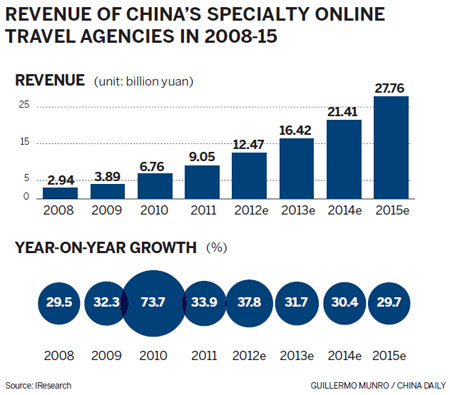Nation's new compass
Updated: 2012-04-13 08:49
By Lin Jing and Su Zhou (China Daily European Edition)
|
|||||||||||
|
Arc de Triomphe in Paris is one of the many destinations of Chinese travelers. An increasing number of Chinese people going overseas has helped boost the online travel business. Provided to China Daily |
|
|
Budding online travel industry is providing chinese travelers with efficient tools to vacation
On March, 15 Chinese tourists bought an around-the-world trip that lasted about 80 days, probably feeling as cavalier as Phileas Fogg in his 1873 novel Around the World in Eighty Days, except for one big difference: Fogg accomplished his trip with 20,000 pounds, which amounts to about $2.1 million today. The group from China? It spent about $158,000. And while Fogg probably used a rusty compass as his guide, the Chinese travelers had three major advantages. They had a computer, the World Wide Web and a handy online travel agency.
| ||||
As disposable incomes rise in the second-biggest economy in the world, more and more people in China are spending it on vacations, from going to the United Kingdom for shopping sprees to Australia for the casinos and resorts. One major consequence of this rush to travel is immediate growth in the online travel industry.
In 2011, there were 70.25 million outbound Chinese tourists, up 22.42 percent from the previous year, according to statistics from the National Tourism Administration (NTA). That total is expected to grow this year to about 77 million.
Domestically, the number of trips in China is staggering. In the past year, there were 2.64 billion domestic travelers, up from 2.3 billion in 2010. According to the NTA, in 2011 China contributed 30 percent in terms of sales revenue to the global travel industry.
Coupled with the fact that China has 195 million online shoppers, the highest total in the world, with about three-fourths of them booking trips online and you have the recipe for financial success for the nation's online travel agencies.
"It is more efficient for Chinese tourists to seek cheaper prices and better choices online," says Hou Tao, director of the research division of online travel site Qunar.com. "The profit for online travel agencies is more than traditional ones, so we have witnessed a rapid growth."
The online travel industry saw annual sales of 9.05 billion yuan ($1.4 billion, 1.1 billion euros) in 2011, an increase of nearly 34 percent from the previous year, with annual sales expected to grow at an average clip of 45 percent, according to Shanghai-based iResearch Consulting Group.
One of the major beneficiaries in China's penchant to book online and travel is Taobao.com, the retail arm of e-commerce giant Alibaba Group. Taobao launched an online travel service in May 2010 and recorded transactions of 10.9 billion yuan last year, an increase of 122 percent from the previous year. This figure includes direct sales between customers and airlines/hotels.
Most online agencies have a common business model of having customers search on their sites for deals and handling transactions.
Taobao, on the other hand, took advantage of its business-to-consumer model to attract hotels and airline companies to launch their own e-commerce sites on its platform. The move has been highly successful in terms of traffic, but thus far has yet to make a profit.
"Taobao's travel business is still a platform for search, display and e-commerce transactions," says Zhang Lingxiao, public relations manager at Taobao. "As an entrance for the majority of Chinese online shoppers, Taobao Travel can help to acquire more traffic."
Still, Ctrip is the leader in this industry, acting as a portal for airlines and hotels to distribute their business online while taking a commission from transactions. It also provides a whole slew of services from transportation, accommodations and restaurant listings to tour arrangements.
According to its 2011 financial report, the company reported 3.5 billion yuan in total revenues, up 21 percent from 2010. With nearly 50-percent market share and 41-percent annual growth from 2004 to 2009, Ctrip is planning to focus more heavily on outbound traveling.
In March, the company launched a new booking platform for international flights. The platform will increase the number of air routes that the company offers by 10,000.
"The new platform will boost Ctrip's flight business and outbound tourism and will contribute at least 50 percent growth to our flight sector," says Guo Dongjie, vice-president of the Nasdaq-listed company. Ctrip also recently launched a high-end outbound travel platform called HHtravel.com in conjunction with Taiwan-based EZTravel.com and Hong Kong-based WingOnTravel.com. The site offers 50 trip routes, with prices ranging from 50,000 yuan to 100,000 yuan per trip. Guo says Ctrip has received positive market response to the new site.
"Take the most expensive worldwide tour for example, we only organize such tours once a year," says Guo. "It took nine minutes to sell out the limited 15 tickets (for the trip around the world) in the first year but only took 17 seconds this year."
The next globetrotting trip will begin in January 2013 and Guo says he is confident in the high-end market and says the potential in the niche industry is great.
Lvmama.com, a company that initially began selling tickets for tourist attractions, is also shifting its core business to outbound tourism. It recently acquired Synwalk Travel Co Ltd based in Shanghai.
In only six months after it began shifting to outbound tourism, the division has accounted for about 30 percent of the company's total revenue. Li Dan, general manager of Lvmama, said the business has grown fourfold since last August.
One of Lvmama's interesting vacational products is the option to reserve a "new concept trip". It allows people to experience an overseas trip under a specific theme, such as a 32-day trip to Africa or driving to London to watch the 2012 Olympic Games.
Its strategy to tailor its business to high-end customers in recent years has reaped dividends. Lvmama's monthly sales have increased 40 percent to 50 percent and it has plans to open 15-20 branches in China this year. But Hou from Qunar says domestic tourism is still where the money is at. Despite the fact that profits in outbound tourism currently dwarfs profits in domestic traveling, it's far too early in a fledging online travel industry to depend on high-end tourism as a mainstream business model.
"Leaders or smaller player in this field should refine their strategies for further development since competition in hotel, flight booking and business trips is already too fierce," Hou says.
Wang Tingting, an iResearch analyst, says that though Ctrip has the largest market share, the market is far from saturated.
"In the online travel industry, the cake is still big enough for all parties. And the future competition of online travel industry relies in the diversification of different business models of commission or platform," Wang says. "With a lower cost in service fees and sales expenses, these platforms will keep attracting more consumers. But companies that rely on commission can also attract customers by providing high-quality service."
Wang adds that companies "should work more on their brand awareness to potential tourists if they want to keep their business growing in this sector".
Several online travel agencies are indeed working to develop new growth models. Many are trying, like Ctrip, to gain more revenue through outbound tourism.
One innovative travel search site is Qunar, which is majority-owned by search giant Baidu Inc. The Chinese-language site has quickly become one of the leading online travel sites in China, with more than 60 million monthly visits.
Its formula is simple: it allows the best choices through its search technology that gives users real-time results from the latest Chinese travel deals.
Its mobile app has also done well, with 7 million users. It recently received an award from Apple as the best.
Jingdong Mall (also known as 360buy.com), is an Amazon-like company in China that opened an online hotel booking division in February. Prior to that Jingdong had worked with online travel site Mangocity.com (which has an 8.8-percent market share in the industry) on an online flight-booking venture.
In its new division, Jingdong has set up deals with more than 20,000 hotels across China and is planning to create an online travel channel to promote car rental deals, cruises and educate tourists on its visa services.
Contact the writers at linjingcd@chinadaily.com.cn and suzhou@chinadaily.com.cn

Today's Top News
Rescuers race against time for quake victims
Telecom workers restore links
Coal mine blast kills 18 in Jilin
Intl scholarship puts China on the map
More bird flu patients discharged
Gold loses sheen, but still a safe bet
US 'turns blind eye to human rights'
Telecom workers restore links
Hot Topics
Lunar probe , China growth forecasts, Emission rules get tougher, China seen through 'colored lens', International board,
Editor's Picks

|

|

|

|

|

|









